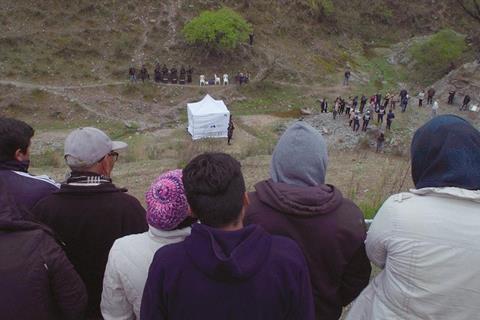The writer/director’s debut documentary focuses on a real-life murder trial

Dir. Lucrecia Martel. Argentina/US/Mexico/France/Netherlands/Denmark 2025. 122mins
Over four fiction features, beginning with 2001’s La Cienaga (The Swamp), Argentinian writer-director Lucrecia Martel established herself as a bold explorer of narrative film language. Now she takes on the challenge of documentary in the Spanish-language Landmarks, her first picture since 2017’s period drama Zama. Landmarks may not strictly be the film that admirers of Martel’s formal radicalism have been waiting for: notwithstanding some eccentricities, it is a relatively conventional work. But it’s very much from the heart, and from the political conscience – a critique of colonial history and the enduring abuse of power in Argentina. Whether taken on its own terms, or an intriguing left turn in Martel’s auteur oeuvre, this surprisingly direct statement should attract attention following its Venice bow.
Above all, Landmarks lets the people tell their own story
Landmarks (Spanish title: Nuestra Tierra, ‘Our Land’) focuses on a trial – held nearly nine years after the event – of three men for the October 2009 murder of Javier Chocobar, an Indigenous community leader from Argentina’s northwestern Tucumán province. This is territory long inhabited by the Chuschagasta people – although their historic right to the land continues to be contested, notably by people who would claim it as their own.
One such is local landowner and businessman Dario Luis Amín, one of three defendants together with former police officers Luis Humberto Gómez and José Valdivieso. They were involved in a confrontation with a group of Chuschagasta residents, which resulted in Chocobar being shot dead and two other community members wounded.
Co-scripted by Martel and Maria Alché – the young lead in Martel’s The Holy Girl, now a reputed writer-director herself (A Family Submerged, Puán) – Landmarks follows the trial, which hinges on a piece of shaky video footage showing Chocobar’s death. What makes this feel very much a Martel film – in content, if not always in form – is the degree of confusion that surrounds the incident. Martel doesn’t provide easy signposts to tell us who is who, but places the viewer in the position of an observer who may have just walked into the court, leaving us to work out the issues and characters ourselves. Much of the content is surprising: a defendant is allowed to hold an official courtroom ‘confrontation’ with a young Chuschagasta man, aggressively hectoring him: a vivid image of the abusive entitlement that, as Landmarks demonstrates, is an enduring legacy of Argentina’s colonial history.
Martel builds up a layered ensemble portrait of the community, with Chocobar’s widow Antonia Hortensia Mamaní sharing her memories and photographs. Pictures of the Chuschagasta people, taken over decades, represent a vast repository of cultural memory, belying the argument of the defence team that this community has neither real rights nor real identity. Such comments, Landmarks shows, are part of Argentina’s long-term erasure, and indeed demonising, of its Indigenous peoples. (In one church mural, they are unambiguously portrayed as a bloodthirsty horde).
Running throughout is a strand of spectacular drone footage sweeping over a mountainous landscape, sometimes ranging freely, at other points moving jerkily like a surveillance device – but very much connecting the Chuschagasta people with the territory. Martel makes us very aware of the drone itself as an active, inquisitive presence, whether it is stalking a suspicious horse, or crashing to the ground after colliding with a bird. A more surprising choice – introducing an incongruous note of Malick-style cosmic awe – is the opening imagery of the Earth seen from space, accompanied by a heavenly choir, before we descend to overhead footage of a patchwork of agricultural land, foreshadowing the film’s own mosaic structure.
As Landmarks goes on, it becomes much clearer in its depiction of the issues at hand, and indeed explicitly polemical – not least in a voice-over by singer Mariana Carrizo, protesting against the disempowering of Argentina’s indigenous peoples. While various experts also state the case for the Chuscagasta, what is essential about Landmarks is that, above all, it lets the people tell their own story. As the end titles suggest, though, theirs continues to be a hard-fought struggle, even if justice appears at times to briefly – all too briefly – prevail.
Production companies: Rei Pictures, Louverture Films, Piano
International sales: The Match Factory info@matchfactory.de
Producers: Benjamin Domenech, Santiago Galelli, Matías Roveda, Joslyn Barnes, Julio Chavezmontes, Javier Leoz
Screenplay: Lucrecia Martel, María Alché
Cinematography: Ernesto de Carvalho
Editors: Jeronimo Pérez Rioja, Miguel Schverdfinger
Music: Alfonso Olguín















![[L-R]: Amanda Villavieja, Laia Casanovas, Yasmina Praderas](https://d1nslcd7m2225b.cloudfront.net/Pictures/274x183/6/4/1/1471641_pxl_20251224_103354743_618426_crop.jpg)








